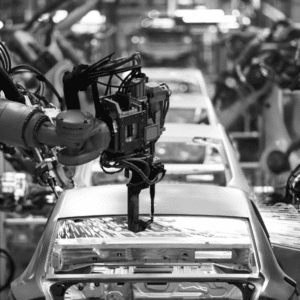Information Management for the Manufacturing Sector
From small machine shops to large fabrication facilities, manufacturing businesses depend on effective information management. Manufacturing information management systems offer such businesses real-time insights into the status of production.
Making information available at the right time and in the right context saves knowledge workers' time. Additionally, information management systems can help improve document security.
Information Management System Benefits

Modern information technology and document management software can improve access to information, data security, and compliance. It can also improve efficiency by automating common business processes.
- Access: Document management programs make information easy to find and use, putting an end to information chaos. This reduces the amount of time workers spend searching for the right folders, files, or versions.
- Data security: Modern knowledge management software offers document control features that simplify security. With granular permissions-based controls, businesses can limit user access to only those who need it. Similarly, an audit trail keeps a full record of who accessed or made changes to a given document and when.
- Compliance: A cloud document management platform allows businesses to easily track and monitor quality management processes. A good document management system (DMS) can help with ISO 9001 compliance, for example. Using business process modeling (BPM modeling), manufacturers can create defined workflows to help audits flow smoothly from start to finish.
- Automation: Information management systems let businesses create automated workflows, saving time, reducing errors, and improving project management. Normally, knowledge workers waste time performing tasks like manually passing off documents, tracking versions, and chasing down approvals. By comparison, information management software automatically provides information to those who need it when they need it.
AI and Automation
From food processing facilities to automotive plants, modern manufacturing floors are a marvel of automation. However, knowledge work automation in the manufacturing space has tended to lag.
That is changing now, thanks to recent advances in AI. Generative AI chatbots like ChatGPT are surprising knowledge workers and business leaders alike. They offer impressive creative, collaborative, and problem-solving capabilities. Workers can receive information, suggestions, and ideas from the chatbots simply by typing a question into the user interface.

Many advanced technologies work behind the scenes to make ChatGPT possible. The most important is its large language model (LLM). Chatbots like ChatGPT train on large datasets and eventually learn to produce human-like text. Currently, this technology is shaping the future of automation far more than any advancement in robotics.
AI Automation and Information Management
Business information management systems organize documents so knowledge users can find and use them in the right context. They also improve efficiency by automating document-centric workflows, including document creation, sharing, collaboration , and approval.
Like many other knowledge work areas, information management can benefit massively from artificial intelligence (AI). AI knowledge management helps workers organize information better and understand the context of documents. It also allows them to interact with business knowledge using natural language.
For example, adding an AI chatbot into the information management system allows workers to find documents just by asking for them. Workers can also use the chatbot to summarize documents, pull answers to data queries, or translate content into other languages.
FAQ: Manufacturing Information Management
What is an information management system?
An information management system stores, organizes, and shares information so that team members can find and use it when they need it. It helps a business operate efficiently.
The essential component of effective information management is automation. The right knowledge management system will automatically comb through business data and classify large volumes of data using metadata. This lets workers easily find what they’re looking for.
What is document automation?
Document automation is all about saving knowledge workers’ time. A document automation system serves as an important company knowledge base with all the best practices, playbooks, and instructions at users’ fingertips. With a robust library of document templates and elements, workers can stop reinventing the wheel when they start a new project.
How do you automate a document?
The best way to automate a document is with a no-code, graphical user interface-based document automation system. This allows users to get up and running in just a few minutes. As a result, they can start getting real value from automation almost immediately.
What do knowledge workers stand to gain from automation?
A lot of knowledge work consists of time-consuming manual processes. These processes don’t make use of knowledge workers’ creative and problem-solving know-how. Automation lets knowledge workers spend more time on high-level decision-making and complex problem-solving.
This results in a more stimulating, satisfying work environment for knowledge workers in the long term. It also makes workers more efficient and effective.
FAQ
What is knowledge automation?
Knowledge automation is the use of technology to perform tasks that traditionally require human intelligence and decision-making.
Why should we use automation of knowledge work?
Automation of knowledge work simplifies repetitive tasks and allows professionals to focus on more complex problem-solving aspects of their work.
Why is automation of knowledge work disruptive?
It performs tasks traditionally performed by humans, leading to shifts in job roles, skills, and business processes.
How should business leaders implement decision management in business processes using knowledge automation?
Business leaders should figure out important decision points in their processes and use knowledge automation. By using programs with learning abilities, they can make sure decision-making becomes smarter over time.
